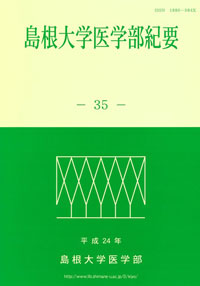島根大学医学部
ISSN:1880-084X

ダウンロード数 : ? 件
この文献の参照には次のURLをご利用ください : https://ir.lib.shimane-u.ac.jp/6902
島根大学医学部紀要 31
2008-12-01 発行
農村部の施設入所高齢者に特徴的な老いの意識
Characteristics of the aging awareness of senior citizens living in a healthcare facility in a rural community
沖中 由美
ファイル
内容記述(抄録等)
The purpose of this study is to clarify their characteristics of self-awareness of senior citizens with disabilities living in a rural community. Data was collected through semi-structured individual interviews with eleven people living in healthcare facilities in a rural community, and was analyzed and compared with that in a urban community. I found their self-awareness can be categorized as charactenstics of a rural community: "our native places 'the land' have been the most important all through our lives", "when old, we have to obey our children", "we have the power to live positively". I found that the senior citizens living in the rural community had self-awareness through the relationships with their native place and the people closest to them, and were supported by 'the land'. They also refrained from speaking their mind, because they lived by to obey their children. Based on these results I found nursing practices should be carried out for senior citizens living in a healthcare facility accordding to their self-awareness in the particular community they live in.
本研究の目的は,農村部の施設入所高齢者に特徴的な老いの意識を見出すことである。データ収集は,半構成的面接法により農村部の介護老人保健施設に入所している高齢者11名に個別面接を行い,都市部の施設入所高齢者の自己意識のあり様と比較し分析した。その結果,農村部に特徴的な老いの意識として,【「土地」が自分の生きてきた証】【老いては子に従え】【生きていける前向きな力】が見出された。農村部の施設入所高齢者は,土着の場と身近な人との関係性を通して自己意識をいだき,「土地」が自己を支えていると意識していた。その一方,子に従うことにより,自己主張を控えながら老いを生きていた。この結果から,地域性による施設入所高齢者の老いの意識の特徴を踏まえた援助の必要性が示唆された。
Other Article
